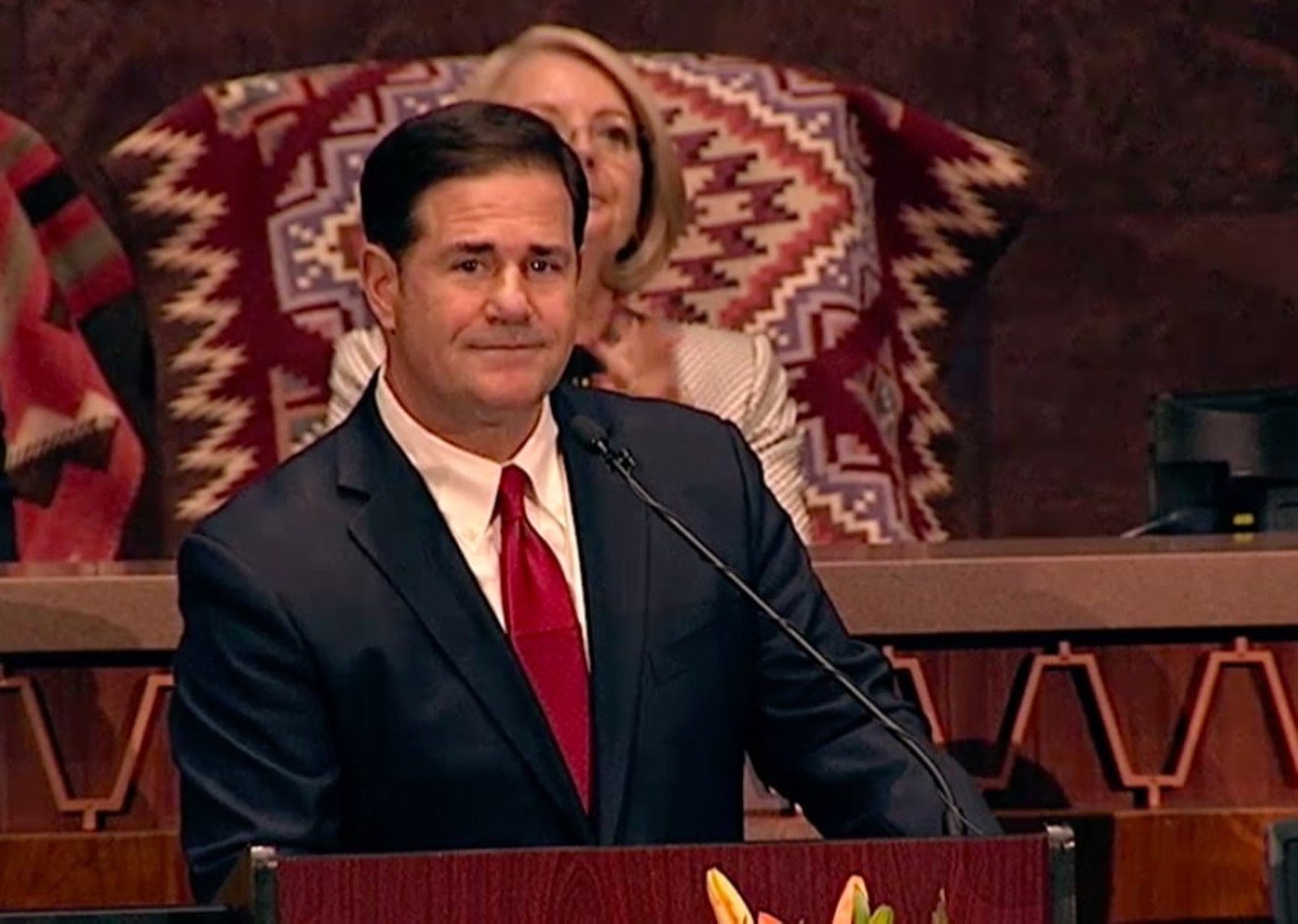Critics are questioning whether rebranding the Arizona Department of Corrections as the Department of Corrections, Rehabilitation and Reentry will translate into badly needed criminal justice reforms.
Governor Doug Ducey announced the department’s new name in front of state lawmakers on Monday as part of his annual “State of the State” speech, saying the new moniker “more clearly reflects the agency’s mission” under newly appointed director David Shinn.
The name change announcement drew applause, but Democratic State Senator Tony Navarrete said he thinks Ducey’s announcement is like putting “lipstick on a pig.”
“That’s all it is,” Navarrete said in an interview with Phoenix New Times. “A name change is not a plan. He’s not addressing these issues in terms of why our budget is so high with the Department of Corrections, why there’s so much turnover, why our sentences are so long and costing the public so much.”
Arizona has the fourth-highest incarceration rate in the country, with around 42,000 inmates behind bars as of November, according to ADC data. The state prison system has the third-largest state agency budget, after the Department of Education and the AHCCCS, the state Medicaid agency.
Ducey announced Monday that along with the name change, he would include funding in his executive budget to expand educational opportunities for inmates, building on the department’s Second Chance Centers, which have equipped some 4,000 inmates with career skills in the past two years.
He also said his budget “supports appropriating a portion of funds from the Medical Marijuana Fund” to expand substance abuse programming, provide student loan repayment to prison substance abuse counselors, and more. But he can’t allocate that money unilaterally. Because voters approved the medical marijuana program and fund in a ballot initiative, any changes would require a three-quarters vote super-majority in both state houses, Navarrete confirmed.
A look at current Department of Corrections data indicates that the services already being offered by the state only help a limited number of inmates. For example, though 78 percent of inmates assessed at intake have “significant substance abuse histories,” according to the ADC, just 933 — about 2 percent — were in addiction treatment programs as of November 2019. And while the Second Chance Centers helped more than 2,400 inmates get jobs on release, according to Ducey, more than 17,000 inmates were released from ADC custody last year.
Caroline Isaacs, program director for the American Friends Service Committee of Arizona, told New Times she’s glad to see Ducey at least acknowledging the need for prison reform. But, she said, “the devil’s always in the details ... What remains to be seen is how he plans to put meat on the bones of this idea of really changing the Department of Corrections’ focus and mission and purpose.”
Just as concerning, Isaacs said, is the corresponding plan Ducey announced in his Monday address — that he would shut down Florence State Prison and send its thousands of inmates to county facilities and third-party operators. Ducey said the move would save Arizona $274 million over three years.
According to Isaacs, "third-party operators" translates to private prison companies like CoreCivic and GeoGroup.
“That deeply concerns me,” she said. “If he’s concerned about staff turnover and problems with staffing, if he’s concerned about lack of rehabilitation services, we already know that we’re losing money on the contracts that we have with private prisons. This is not progress.”
Isaacs said she hopes that the State Legislature can pass bills on criminal justice reforms that have been proposed and received bipartisan support. She said while resources for inmates and a statewide re-entry program are important, the state also needs to better address “the root of the behavior.”
“If you have someone who is mentally ill, if you have someone who is profoundly addicted to substances, there is a way to address that problem,” she said. “Putting them in a prison cell” and “saddling them with a felony conviction” that will follow them around the rest of their lives doesn’t help, she said.
The ADC didn’t respond to requests for comment about its current inmate services or the impending changes to the agency.
Ducey also promoted a range of other proposals in his annual address, including body cameras for all state troopers, an expansion of the highway connecting Phoenix and Tucson, and an initiative to ban sanctuary cities, among others.
[
{
"name": "Air - MediumRectangle - Inline Content - Mobile Display Size",
"component": "18478561",
"insertPoint": "2",
"requiredCountToDisplay": "2"
},{
"name": "Editor Picks",
"component": "16759093",
"insertPoint": "4",
"requiredCountToDisplay": "1"
},{
"name": "Inline Links",
"component": "17980324",
"insertPoint": "8th",
"startingPoint": 8,
"requiredCountToDisplay": "7",
"maxInsertions": 25
},{
"name": "Air - MediumRectangle - Combo - Inline Content",
"component": "16759092",
"insertPoint": "8th",
"startingPoint": 8,
"requiredCountToDisplay": "7",
"maxInsertions": 25
},{
"name": "Inline Links",
"component": "17980324",
"insertPoint": "8th",
"startingPoint": 12,
"requiredCountToDisplay": "11",
"maxInsertions": 24
},{
"name": "Air - Leaderboard Tower - Combo - Inline Content",
"component": "16759094",
"insertPoint": "8th",
"startingPoint": 12,
"requiredCountToDisplay": "11",
"maxInsertions": 24
}
]











